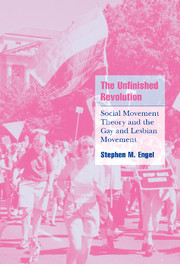Book contents
- Frontmatter
- Contents
- Notes on language
- Preface
- Introduction
- 1 Asked and answered: how questions can condition conclusions in social movement theory
- 2 Tracing the rainbow: an historical sketch of the American gay and lesbian movement
- 3 Tracing the rainbow: an historical sketch of the British gay and lesbian movement
- 4 Where and how it comes to pass: interest group interaction with political institutions
- 5 Asking the unasked question: grappling with the culture variable
- Conclusion
- Appendix: a survey of social movement theories
- Notes
- Bibliography
- Index
4 - Where and how it comes to pass: interest group interaction with political institutions
Published online by Cambridge University Press: 31 October 2009
- Frontmatter
- Contents
- Notes on language
- Preface
- Introduction
- 1 Asked and answered: how questions can condition conclusions in social movement theory
- 2 Tracing the rainbow: an historical sketch of the American gay and lesbian movement
- 3 Tracing the rainbow: an historical sketch of the British gay and lesbian movement
- 4 Where and how it comes to pass: interest group interaction with political institutions
- 5 Asking the unasked question: grappling with the culture variable
- Conclusion
- Appendix: a survey of social movement theories
- Notes
- Bibliography
- Index
Summary
Reassessing and expanding the model
Interest group access in parliamentary systems is often more structured and executive-centered than in the United States. But this does not mean that interest groups are less influential. In many parliamentary systems, interest groups may be less well placed than their American counterparts to overturn government decisions that conflict with their goals, but they may be better placed to ensure that such decisions are never made to begin with.
R. Kent Weaver and Bert A. Rockman, Do Institutions Matter?The previous two chapters have traced the parallel developmental pattern of the British and American gay and lesbian movements: a changing opportunity – or multiple opportunities – was exploited by pre-existing organizations and coupled with cognitive liberation and subsequent collective affirmative identity formation to produce a social movement. This movement then spurred sundry interest groups at various levels of government. These histories are paradoxical; although the American movement emerged first, was recognized as the international leader, and maintained the largest mass constituency, it has been unable to secure any formalized national recognition of legal equality. Yet, its smaller British counterpart achieved this feat at a date when a movement – as defined by the political process model – had not yet fully formed.
Similar mobilization histories are told with regard to the AIDS crisis possibly because AIDS acts as an exogenous shock to the movement. In other words, AIDS was recognized as a global crisis fostering mobilization by gay organizations throughout the world. Second, both the United States and the United Kingdom were governed by conservative leaders at the beginning of the epidemic.
- Type
- Chapter
- Information
- The Unfinished RevolutionSocial Movement Theory and the Gay and Lesbian Movement, pp. 99 - 122Publisher: Cambridge University PressPrint publication year: 2001



